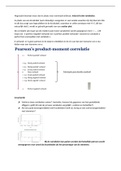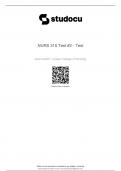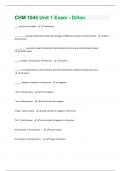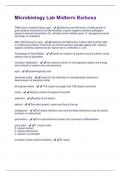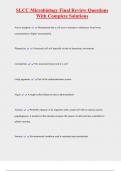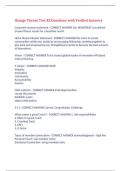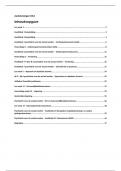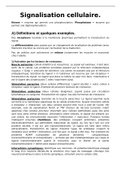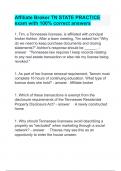Case 1- Atrial Fibrillation Notes:
01) What is the definition of atrial fibrillation?
Atrial fibrillation (or known as A-fib) is an irregular heart rhythm that
occurs when the electrical signals in the atria fire rapidly at the same
time which causes the heart to beat faster than normal.
• In atrial fibrillation, the signals in the atria are chaotic and as a
result causes the atria to quiver. The AV node is then bombarded
with signals trying to get through to the ventricles which causes a
fast and irregular heart rhythm
- The heart rate of patients with atrial fibrillation may range from
100-175 beats a minutes
02) What is the definition of first diagnosed atrial fibrillation?
First diagnosed atrial fibrillation is atrial fibrillation that has not been
diagnosed before, irrespective of the duration of arrhythmia or the
presence and severity of AF related symptoms.
03) What is the definition of paroxysmal atrial fibrillation?
Paroxysmal atrial fibrillation are episodes of A-fib that occur
occasionally and usually stop spontaneously. Episodes can last from
48 hours to 7 days.
04) What is the definition of persistent atrial fibrillation?
Persistant atrial fibrillation lasts longer than 7 days including episodes
that are terminated by cardio version either with drugs or by direct
current cardio version after 7 days or more.
05) What is the definition of long standing persistent atrial fibrillation?
Long standing persistent atrial fibrillation is when the arrhythmia lasts
for an entire year without stopping where it’s decided to adopt a
rhythm control strategy/
,06) What is the definition of permanent atrial fibrillation?
Permanent atrial fibrillation is where the irregular heart rhythm can’t
be restored and maintenance of sinus rhythm has either failed or a
decision has been named to not attempt rhythm control.
07) Explain why should we be worried about atrial fibrillation?
• Some patients with atrial fibrillation can be asymptomatic
• There may be a reason or a treatable underlying cause
• Patients with atrial fibrillation can increase their risk of stroke by 5
times
• Untreated patients with atrial fibrillation who have stroke tend to
have more fatal or depleting strokes
- Patients with AF have an increased risk of stroke because blood is
not flowing smoothly around the atrium as it’s just fibrillation so it
does not completely move out of the heart chamber
- As a result, blood can stagnate and form clots particularly in the
left atrium (or known as left atrial appendage)
- If a little bit of the clot breaks up, it will travel in circulation towards
the brain where it will cause a blockage in the blood vessels. If you
have a blockage, then you have no further blood flow and no
oxygen supply to the affected portion of the brain which results in
an ischaemic stroke
So if a patient has atrial fibrillation, it’s really important to assess
their risk of stroke:
- Stroke Risk Assessment = which is an estimation of the risk of stroke
or systemic blood clot for a patient with atrial fibrillation in the next
year
- Bleeding Risk Assessment = which is an estimation of the risk of
bleeding for a patient with AF in the next year
- Modifiable Risk Factor = which is a risk factor that can be altered
by a change in patient behaviour or by medical intervention
, The CHA2DS2- VASc Score are clinical prediction rules for
estimating the risk of stroke in patients with non-rheumatic atrial
fibrillation, Such a score is used to determine whether or not
treatment is required with anticoagulation or anti platelet therapy
- The higher the score, there’s an higher chance for ischaemic stroke
risk
• A patient who has a score of 0 = recommend no antithrombotic
therapy
• A patient who has a score of 1 = recommend antithrombotic
therapy with oral anticoagulation or anti platelet therapy
• A patient with a score >2 = recommend oral anticoagulation
A bleeding risk score also has to be established when considering
starting anticoagulation in patients with atrial fibrillation and also
reviewing patients already taking anticoagulants. The ORBIT
bleeding risk score can be used:
, - The higher the score, the more likely the patient is prone to
bleeding
The first line anticoagulant therapy for patients with atrial fibrillation
is Directly acting Oral Anti-Coagulants e.g apixaban, rivaroxaban,
dabigatran, edoxaban
• If Direct-acting oral anticoagulants are contraindicated, not
tolerated or not suitable in patients with atrial fibrillation, offer a
Vitamin K antagonist e.g Warfarin
• For adults with atrial fibrillation who are already taking Vitamin K
antagonist and are stable, continue with their current medications
and discuss the option of switching treatment at their next routine
appointment taking into account the person’s time in therapeutic
range
01) What is the definition of atrial fibrillation?
Atrial fibrillation (or known as A-fib) is an irregular heart rhythm that
occurs when the electrical signals in the atria fire rapidly at the same
time which causes the heart to beat faster than normal.
• In atrial fibrillation, the signals in the atria are chaotic and as a
result causes the atria to quiver. The AV node is then bombarded
with signals trying to get through to the ventricles which causes a
fast and irregular heart rhythm
- The heart rate of patients with atrial fibrillation may range from
100-175 beats a minutes
02) What is the definition of first diagnosed atrial fibrillation?
First diagnosed atrial fibrillation is atrial fibrillation that has not been
diagnosed before, irrespective of the duration of arrhythmia or the
presence and severity of AF related symptoms.
03) What is the definition of paroxysmal atrial fibrillation?
Paroxysmal atrial fibrillation are episodes of A-fib that occur
occasionally and usually stop spontaneously. Episodes can last from
48 hours to 7 days.
04) What is the definition of persistent atrial fibrillation?
Persistant atrial fibrillation lasts longer than 7 days including episodes
that are terminated by cardio version either with drugs or by direct
current cardio version after 7 days or more.
05) What is the definition of long standing persistent atrial fibrillation?
Long standing persistent atrial fibrillation is when the arrhythmia lasts
for an entire year without stopping where it’s decided to adopt a
rhythm control strategy/
,06) What is the definition of permanent atrial fibrillation?
Permanent atrial fibrillation is where the irregular heart rhythm can’t
be restored and maintenance of sinus rhythm has either failed or a
decision has been named to not attempt rhythm control.
07) Explain why should we be worried about atrial fibrillation?
• Some patients with atrial fibrillation can be asymptomatic
• There may be a reason or a treatable underlying cause
• Patients with atrial fibrillation can increase their risk of stroke by 5
times
• Untreated patients with atrial fibrillation who have stroke tend to
have more fatal or depleting strokes
- Patients with AF have an increased risk of stroke because blood is
not flowing smoothly around the atrium as it’s just fibrillation so it
does not completely move out of the heart chamber
- As a result, blood can stagnate and form clots particularly in the
left atrium (or known as left atrial appendage)
- If a little bit of the clot breaks up, it will travel in circulation towards
the brain where it will cause a blockage in the blood vessels. If you
have a blockage, then you have no further blood flow and no
oxygen supply to the affected portion of the brain which results in
an ischaemic stroke
So if a patient has atrial fibrillation, it’s really important to assess
their risk of stroke:
- Stroke Risk Assessment = which is an estimation of the risk of stroke
or systemic blood clot for a patient with atrial fibrillation in the next
year
- Bleeding Risk Assessment = which is an estimation of the risk of
bleeding for a patient with AF in the next year
- Modifiable Risk Factor = which is a risk factor that can be altered
by a change in patient behaviour or by medical intervention
, The CHA2DS2- VASc Score are clinical prediction rules for
estimating the risk of stroke in patients with non-rheumatic atrial
fibrillation, Such a score is used to determine whether or not
treatment is required with anticoagulation or anti platelet therapy
- The higher the score, there’s an higher chance for ischaemic stroke
risk
• A patient who has a score of 0 = recommend no antithrombotic
therapy
• A patient who has a score of 1 = recommend antithrombotic
therapy with oral anticoagulation or anti platelet therapy
• A patient with a score >2 = recommend oral anticoagulation
A bleeding risk score also has to be established when considering
starting anticoagulation in patients with atrial fibrillation and also
reviewing patients already taking anticoagulants. The ORBIT
bleeding risk score can be used:
, - The higher the score, the more likely the patient is prone to
bleeding
The first line anticoagulant therapy for patients with atrial fibrillation
is Directly acting Oral Anti-Coagulants e.g apixaban, rivaroxaban,
dabigatran, edoxaban
• If Direct-acting oral anticoagulants are contraindicated, not
tolerated or not suitable in patients with atrial fibrillation, offer a
Vitamin K antagonist e.g Warfarin
• For adults with atrial fibrillation who are already taking Vitamin K
antagonist and are stable, continue with their current medications
and discuss the option of switching treatment at their next routine
appointment taking into account the person’s time in therapeutic
range

